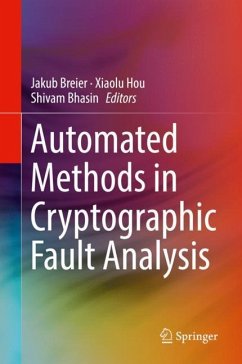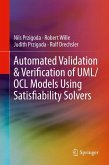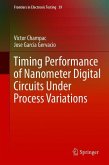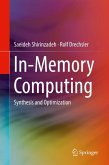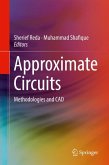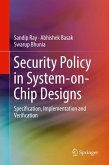Automated Methods in Cryptographic Fault Analysis
Herausgegeben:Breier, Jakub; Hou, Xiaolu; Bhasin, Shivam
Automated Methods in Cryptographic Fault Analysis
Herausgegeben:Breier, Jakub; Hou, Xiaolu; Bhasin, Shivam
- Gebundenes Buch
- Merkliste
- Auf die Merkliste
- Bewerten Bewerten
- Teilen
- Produkt teilen
- Produkterinnerung
- Produkterinnerung
This book presents a collection of automated methods that are useful for different aspects of fault analysis in cryptography. The first part focuses on automated analysis of symmetric cipher design specifications, software implementations, and hardware circuits. The second part provides automated deployment of countermeasures. The third part provides automated evaluation of countermeasures against fault attacks. Finally, the fourth part focuses on automating fault attack experiments. The presented methods enable software developers, circuit designers, and cryptographers to test and harden their products. …mehr
Andere Kunden interessierten sich auch für
![Automated Validation & Verification of UML/OCL Models Using Satisfiability Solvers Automated Validation & Verification of UML/OCL Models Using Satisfiability Solvers]() Nils PrzigodaAutomated Validation & Verification of UML/OCL Models Using Satisfiability Solvers112,99 €
Nils PrzigodaAutomated Validation & Verification of UML/OCL Models Using Satisfiability Solvers112,99 €![Design Automation for Differential MOS Current-Mode Logic Circuits Design Automation for Differential MOS Current-Mode Logic Circuits]() Stéphane BadelDesign Automation for Differential MOS Current-Mode Logic Circuits104,99 €
Stéphane BadelDesign Automation for Differential MOS Current-Mode Logic Circuits104,99 €![Timing Performance of Nanometer Digital Circuits Under Process Variations Timing Performance of Nanometer Digital Circuits Under Process Variations]() Victor ChampacTiming Performance of Nanometer Digital Circuits Under Process Variations90,99 €
Victor ChampacTiming Performance of Nanometer Digital Circuits Under Process Variations90,99 €![In-Memory Computing In-Memory Computing]() Saeideh ShirinzadehIn-Memory Computing75,99 €
Saeideh ShirinzadehIn-Memory Computing75,99 €![Learning from VLSI Design Experience Learning from VLSI Design Experience]() Weng Fook LeeLearning from VLSI Design Experience97,99 €
Weng Fook LeeLearning from VLSI Design Experience97,99 €![Approximate Circuits Approximate Circuits]() Approximate Circuits38,99 €
Approximate Circuits38,99 €![Security Policy in System-on-Chip Designs Security Policy in System-on-Chip Designs]() Sandip RaySecurity Policy in System-on-Chip Designs38,99 €
Sandip RaySecurity Policy in System-on-Chip Designs38,99 €-
-
-
This book presents a collection of automated methods that are useful for different aspects of fault analysis in cryptography. The first part focuses on automated analysis of symmetric cipher design specifications, software implementations, and hardware circuits. The second part provides automated deployment of countermeasures. The third part provides automated evaluation of countermeasures against fault attacks. Finally, the fourth part focuses on automating fault attack experiments. The presented methods enable software developers, circuit designers, and cryptographers to test and harden their products.
Produktdetails
- Produktdetails
- Verlag: Springer / Springer International Publishing / Springer, Berlin
- Artikelnr. des Verlages: 978-3-030-11332-2
- 1st edition 2019
- Seitenzahl: 356
- Erscheinungstermin: 27. März 2019
- Englisch
- Abmessung: 241mm x 160mm x 25mm
- Gewicht: 676g
- ISBN-13: 9783030113322
- ISBN-10: 3030113329
- Artikelnr.: 54727406
- Herstellerkennzeichnung Die Herstellerinformationen sind derzeit nicht verfügbar.
- Verlag: Springer / Springer International Publishing / Springer, Berlin
- Artikelnr. des Verlages: 978-3-030-11332-2
- 1st edition 2019
- Seitenzahl: 356
- Erscheinungstermin: 27. März 2019
- Englisch
- Abmessung: 241mm x 160mm x 25mm
- Gewicht: 676g
- ISBN-13: 9783030113322
- ISBN-10: 3030113329
- Artikelnr.: 54727406
- Herstellerkennzeichnung Die Herstellerinformationen sind derzeit nicht verfügbar.
Jakub Breier currently works as a Senior Cryptography Security Analyst at Underwriters Laboratories, Singapore since 2018, focusing on security evaluation of payment schemes. He finished his PhD in Applied Informatics from Slovak University of Technology in 2013. Before his current role, he worked as a Senior Research Scientist at Physical Analysis and Cryptographic Engineering laboratory at Nanyang Technological University, Singapore between 2013-2018. His main interests include physical attacks on cryptographic circuits, more specifically fault and side-channel attacks with emphasis on automated methods for fault analysis. His research has been published at major venues in computer/hardware security and cryptography. Xiaolu Hou works as a Secure Computing Researcher at Acronis, Singapore since 2018, in the field of secure multi-party computation. She finished her PhD in Mathematics from Nanyang Technological University (NTU) in 2017. During herPhD studies, she was half year with Singapore University of Technology and Design, where she was doing research in location privacy. After her PhD she joined Cyber Security Laboratory, School of Computer Science and Engineering, NTU, as a Research Fellow. Her research focuses on fault injection and side-channel attacks. With a wide range of research interests, she has published her work at top venues within various fields. Shivam Bhasin is a Senior Research Scientist and Principal Investigator at Physical Analysis and Cryptographic Engineering group, Temasek Laboratories, Nanyang Technological University, Singapore since 2015. His research interests include embedded security, trusted computing and secure designs. He received his PhD from Telecom Paristech in 2011, Master's from Mines Saint-Etienne, France in 2008 and Bachelor's from UP Tech, India in 2007. Before NTU, Shivam held position of Research Engineer in Institut Mines-Telecom, France. He was also a visiting researcher at UCL, Belgium (2011) and Kobe University, Japan (2013). He regularly publishes at top peer reviewed journals and conferences. Some of his research now also forms a part of ISO/IEC 17825 standard
Chapter 1. Introduction to Fault Analysis in Cryptography.- Part I. Automated Fault Analysis of Symmetric Block Ciphers.- Chapter 2. ExpFault: An Automated Framework for Block Cipher Fault Analysis.- Chapter 3. Exploitable Fault Space Characterization: A Complementary Approach.- Chapter 4. Differential Fault Analysis Automation on Assembly Code.- Chapter 5. An Automated Framework for Analysis and Evaluation of Algebraic Fault Attacks on Lightweight Block Ciphers.- Chapter 6. Automatic construction of fault attacks on cryptographic hardware implementations.- Part II. Automated Design and Deployment of Fault Countermeasures.- Chapter 7. Automated Deployment of Software Encoding Countermeasure.- Chapter 8. Idempotent Instructions to Counter Fault Analysis Attacks.- Chapter 9. Differential Fault Attack Resistant Hardware Design Automation.- Part III. Automated Analysis of Fault Countermeasures.- Chapter 10. Automated Evaluation of Software Encoding Schemes.- Chapter 11. Automated Evaluation of Concurrent Error Detection Code Protected Hardware Implementations.- Chapter 12. Fault Analysis Assisted by Simulation.- Part IV. Automated Fault Attack Experiments.- Chapter 13. Optimizing Electromagnetic Fault Injection with Genetic Algorithms.- Chapter 14. Automated Profiling Method for Laser Fault Injection in FPGAs.
Chapter 1. Introduction to Fault Analysis in Cryptography.- Part I. Automated Fault Analysis of Symmetric Block Ciphers.- Chapter 2. ExpFault: An Automated Framework for Block Cipher Fault Analysis.- Chapter 3. Exploitable Fault Space Characterization: A Complementary Approach.- Chapter 4. Differential Fault Analysis Automation on Assembly Code.- Chapter 5. An Automated Framework for Analysis and Evaluation of Algebraic Fault Attacks on Lightweight Block Ciphers.- Chapter 6. Automatic construction of fault attacks on cryptographic hardware implementations.- Part II. Automated Design and Deployment of Fault Countermeasures.- Chapter 7. Automated Deployment of Software Encoding Countermeasure.- Chapter 8. Idempotent Instructions to Counter Fault Analysis Attacks.- Chapter 9. Differential Fault Attack Resistant Hardware Design Automation.- Part III. Automated Analysis of Fault Countermeasures.- Chapter 10. Automated Evaluation of Software Encoding Schemes.- Chapter 11. Automated Evaluation of Concurrent Error Detection Code Protected Hardware Implementations.- Chapter 12. Fault Analysis Assisted by Simulation.- Part IV. Automated Fault Attack Experiments.- Chapter 13. Optimizing Electromagnetic Fault Injection with Genetic Algorithms.- Chapter 14. Automated Profiling Method for Laser Fault Injection in FPGAs.

